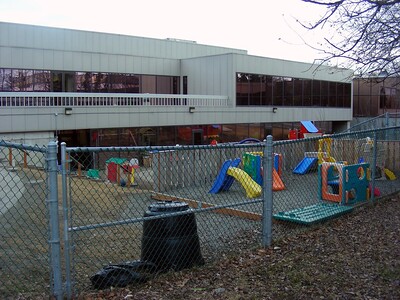A Massachusetts community college has partnered with its local YMCA to offer free drop-in childcare to its staff and students. Northern Essex Community College, which serves residents in Essex County and Southern New Hampshire will use CARES funding to pilot the program.
Under the arrangement, NECC staff and students can receive drop-in care for infants, toddlers, and preschool children. Currently, participants may receive eight hours of drop-in care per week. Community members must also register for the services since only fifteen drop-in slots are available at any given time. Care is available from 8:00 AM to 5:00 PM Monday through Friday. If the pilot program succeeds, NECC will consider extending and/or expanding the program.
According to the NECC administration, it developed the program because one out of every four community college students is also a parent to a minor child. These student parents are disproportionately women and people of color. Fully half of all student parents enrolled in college classes will not complete their degree program. Lack of drop-in childcare and cost are two major reasons these student parents leave school.
The Haverhill YMCA, which delivers the program, has offered licensed, fee-based care on NECC’s campus for about a year. The new pilot eliminates the cost element for students and staff. NECC’s care center is in its Sport and Fitness Center.
Free Drop-in childcare removes attendance barriers
A 2019 report from the US Government Accounting Office (GAO) found that student parents on college campuses often do not use available drop-in childcare resources because they do not know about them. Further, schools rarely make parents aware of available federal funding to pay for services.
The GAO report estimated that about half of all student parents qualify for additional federal financial aid. Students do not take advantage of the additional funding because schools typically do not tell students that funding is available or how to access it.
The GAO report also suggested that access to high-quality, low-cost daycare on campus could also reduce the number of students who default on their student loans. More easily accessible drop-in childcare on campus can increase the likelihood of graduation and promote better economic security.
On-campus drop-in childcare also addresses the unique needs of working student parents. One challenge for community college students is the lack of evening care options. Most daycare centers do not operate after 6:00 PM. That limits the ability of student parents to enroll in evening classes.
The NECC pilot program is unusual among community colleges. The GAO reported that fewer than half of the nation’s public, two-year colleges have on-campus daycare, and the number of campus centers has declined. That is unfortunate. According to the Institute for Women’s Policy Research, a single mother with a college degree could increase her lifetime earnings by $600,000 or more. Additionally, single mothers could generate tens of billions more in economic activity with appropriate higher education and drop-in childcare support.
The NECC pilot demonstrates what’s possible when community college administrators commit to meeting the needs of their campus community members. The WCC administration’s decision to close the Children’s Center demonstrates what happens when they do not.
Photo Credit: Mel Green , via Flickr















